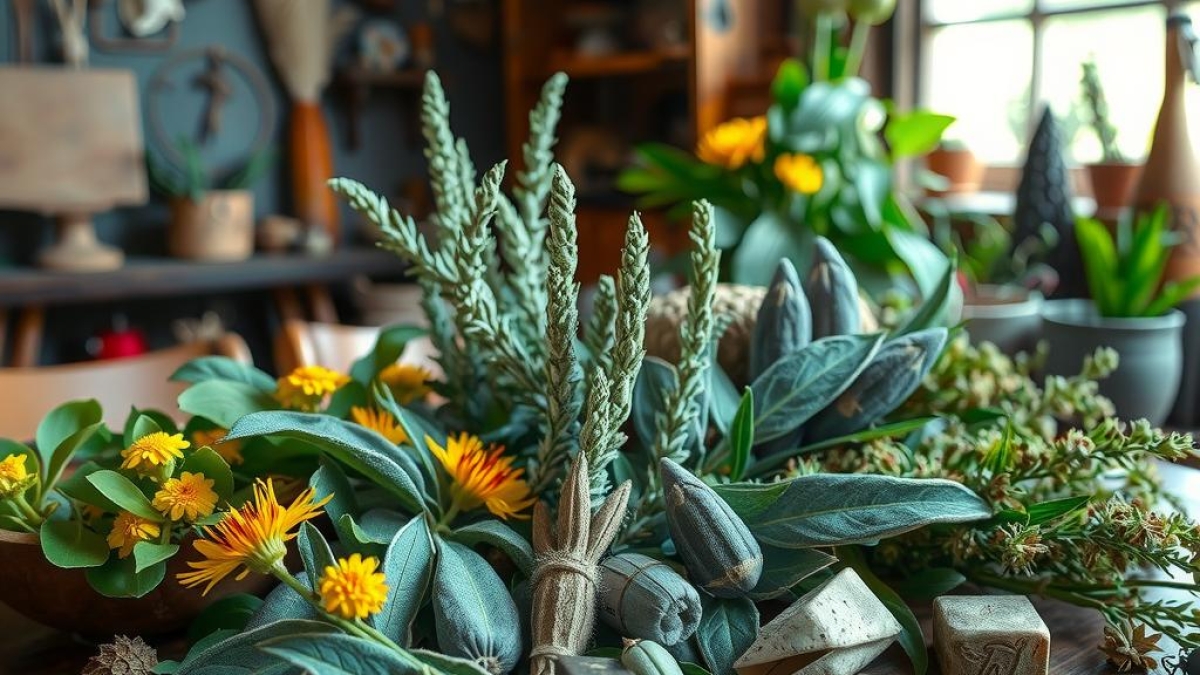In a world increasingly dominated by synthetic solutions to health issues, the enduring wisdom of traditional practices often gets overlooked. Many individuals today grapple with respiratory problems, ranging from seasonal allergies to chronic conditions like asthma and bronchitis. This growing concern for lung health has led many to seek out alternative medicine approaches that are both effective and gentle on the body. Enter native American healing herbs, revered for centuries among indigenous communities for their remarkable properties in promoting wellness, particularly regarding breathing issues.
This article shines a light on ten powerful native American healing herbs that can serve as natural treatments for respiratory ailments. By exploring these herbal remedies, readers will uncover time-tested solutions rooted in nature’s bounty, offering an intriguing perspective on how ancient knowledge can be applied today. Beyond just alleviating symptoms, these herbs aim to foster overall lung health and enhance breathing capacity without the side effects often associated with pharmaceuticals.
As we delve into this exploration of botanical treasures, it becomes clear that each herb holds unique benefits tailored to combat specific respiratory challenges. Whether it’s soothing inflammation or clearing mucus from airways, understanding how these plants work allows individuals to take control of their respiratory wellness in a proactive manner.
Readers will discover not only the individual characteristics of each herb but also practical tips on incorporating them into daily routines—transforming complex formulations into simple teas or tinctures that fit seamlessly into modern lifestyles.
Join us as we embark on this journey through nature’s pharmacy; let the timeless teachings of native American healing herbs guide you toward better breathing and renewed vitality amidst today’s hustle and bustle.

Key points:
-
Herb Selection: A detailed look at specific native American healing herbs known for their respiratory benefits.
-
Properties and Uses: An exploration of the anti-inflammatory and expectorant qualities of these healing herbs, highlighting how they aid lung health.
-
Integration into Daily Life: Practical suggestions on how to incorporate these herbal remedies into everyday routines for improved breathing and overall wellness.
In addressing the growing concerns surrounding respiratory problems, individuals are increasingly turning to nature’s offerings, particularly the powerful remedies found in native American healing herbs. This ancient knowledge provides a rich resource for those seeking alternatives to conventional medicine. Notably, specific plants such as mullein, lobelia, and sage have been recognized for their efficacy in supporting lung function and alleviating breathing issues. Each herb has its unique profile that contributes not only to symptom relief but also promotes long-term respiratory health.
A key aspect of these healing herbs is their inherent properties that directly impact inflammation—a common factor exacerbating conditions like asthma or bronchitis. For instance, mullein serves as an anti-inflammatory agent that soothes irritated airways while also acting as an expectorant to help clear mucus from the lungs. These characteristics empower individuals dealing with chronic respiratory challenges by providing them with natural treatment options grounded in centuries-old practices.
To fully harness the potential of these herbal remedies, it is essential for readers to consider ways to integrate them into daily life seamlessly. Simple methods include brewing herbal teas using dried leaves from plants like lobelia or incorporating sage into meals for flavor while reaping its health benefits. Adopting such habits not only enhances lung health but also fosters a deeper connection with alternative medicine traditions that prioritize holistic well-being over mere symptom management.
By embracing this journey through the world of native American healing herbs, individuals can discover effective strategies tailored towards improving their respiratory function naturally. As modern society continues grappling with various breathing issues, returning to time-honored wisdom may offer invaluable insights toward achieving better overall health—one herb at a time.

Introduction: The Growing Need for Alternative Respiratory Solutions
A Surge in Respiratory Issues: Understanding the Landscape
In recent years, there has been a significant rise in respiratory issues among populations worldwide. Factors such as increased pollution levels, changes in climate, and heightened stress from urban living contribute to these growing concerns about lung health. Many individuals are now grappling with chronic conditions like asthma, chronic obstructive pulmonary disease (COPD), and seasonal allergies that impact their overall quality of life. As conventional treatments often come with side effects or limited efficacy, there is an increasing search for effective alternative solutions. This quest is leading many to explore natural remedies rooted in traditional practices. Among these, Native American healing herbs have emerged as promising options due to their historical use and potential benefits in alleviating breathing problems and enhancing lung function.
Natural Remedies Gaining Popularity
Exploring the Efficacy of Herbal Treatments
The resurgence of interest in herbal remedies can be attributed to a cultural shift towards holistic health approaches emphasizing prevention rather than mere symptom management. Within this framework, herbal treatments derived from Native American healing herbs stand out for their deep-rooted history within indigenous cultures who utilized them effectively long before modern medicine was developed. These natural treatments not only resonate with those seeking alternatives but also hold scientific merit; various studies suggest that certain herbs possess anti-inflammatory properties which may help reduce airway inflammation—one of the primary contributors to respiratory distress. For instance, plants such as mullein and lobelia have been traditionally used by Native Americans for their soothing effects on irritated lungs and airways.
Integrating Traditional Knowledge Into Modern Health Practices
Bridging Ancient Wisdom With Contemporary Needs
Modern society’s inclination towards integrating ancient wisdom into contemporary health practices cannot be overstated; it reflects a broader recognition of the limitations associated with synthetic medications available today. The revival of interest surrounding herbal remedies offers an opportunity not just to alleviate symptoms but also promote overall wellness through preventive measures tailored specifically toward individual needs regarding lung health. By tapping into age-old knowledge passed down through generations—knowledge encompassing various preparations like teas or tinctures made from local flora—individuals can embrace strategies that align better with their lifestyles while potentially minimizing adverse reactions frequently linked with pharmaceutical interventions.
Addressing Chronic Conditions Through Holistic Approaches
Finding Balance Between Nature And Medicine
As respiratory problems become increasingly prevalent globally—a concerning trend exacerbated by lifestyle choices—the importance of addressing these challenges holistically gains traction among healthcare practitioners dedicated to patient-centered care models designed around whole-body wellness principles rather than isolated ailments alone becomes paramount here too! Utilizing Native American healing herbs, carefully selected based on personal constitution alongside existing medical protocols could facilitate smoother recovery journeys while fostering resilience against future episodes related directly back again onto dietary habits environmental exposures etc., thus ensuring comprehensive care pathways remain accessible throughout diverse demographics bridging gaps where traditional systems may fall short!
Future Directions In Respiratory Health Management
Emphasizing Sustainable Practices And Education
Looking forward into the future directionality concerning managing respiratory health proactively demands sustainable engagement across multiple sectors including education outreach initiatives aimed at raising awareness surrounding both preventative measures alongside potential therapeutic benefits offered via alternative medicines particularly those sourced locally! Communities must recognize how vital incorporating insights gained from millennia spent navigating ecological relationships fosters resilience necessary tackling ongoing public health crises facing our generation today particularly when considering implications tied closely together between environment lifestyle choices mental well-being ultimately influencing physical states directly affecting one’s ability breathe freely without discomfort!
Ancient Wisdom Meets Modern Needs
Exploring the Role of Native American Healing Herbs in Respiratory Health
The rich tradition of Native American healing herbs encompasses a wealth of knowledge passed down through generations, specifically focusing on holistic approaches to health and well-being. Among these ancient practices, herbal remedies have long been recognized for their efficacy in addressing various respiratory problems. In many indigenous cultures, plants such as mullein, lobelia, and sage are not merely regarded as flora but are revered as vital components of a comprehensive natural treatment strategy aimed at promoting lung health and alleviating breathing issues. For instance, mullein leaves have been traditionally utilized for their expectorant properties; they help loosen mucus in the lungs while soothing irritation in the airways. This healing herb is often brewed into teas or infused oils that can be inhaled or applied topically to support respiratory function. Moreover, the application of Native American healing herbs extends beyond mere symptom management—it embodies a deeper understanding that emphasizes balance within one’s body and connection to nature.
Integrating Indigenous Knowledge with Contemporary Practices
The Benefits of Herbal Remedies for Lung Health
The integration of indigenous knowledge regarding healing herbs with contemporary practices offers valuable insights into managing respiratory health effectively. Through careful observation and experimentation over centuries, Native Americans discovered how certain plants could alleviate symptoms associated with common ailments like asthma or bronchitis—conditions that persist today across diverse populations. For example, lobelia, often referred to by its scientific name Lobelia inflata, has gained recognition not only among traditional practitioners but also within modern alternative medicine circles due to its bronchodilator properties which help open air passages during respiratory distress. Furthermore, this herb’s active compounds can stimulate secretions from mucus membranes—enhancing overall lung function when properly administered under guidance from knowledgeable herbalists familiar with dosage levels suited for individual needs.
The Importance of Sustainable Practices
Preserving Traditional Wisdom Through Responsible Use
As awareness grows around natural treatments derived from Native American healing herbs, it becomes increasingly important to prioritize sustainable harvesting methods that honor both tradition and ecological responsibility. Overharvesting poses significant threats not only to specific plant species but also disrupts local ecosystems where these invaluable resources thrive naturally. Community-led initiatives advocating for responsible use ensure that future generations maintain access to these potent tools against respiratory challenges without compromising environmental integrity or cultural heritage tied closely with each native species’ existence—a critical aspect emphasized by many indigenous groups involved in conservation efforts today.
Therapeutic Applications and Personal Connections
Enhancing Breathing Issues Management Through Cultural Reverence
Incorporating therapeutic applications involving Native American healing herbs into personal wellness routines fosters a profound sense of connection—not just between individuals and nature but also among communities who share ancestral ties rooted deeply within this wisdom-rich practice system itself! Many people find comfort knowing they draw upon centuries-old traditions when utilizing herbal remedies like sage smudging rituals designed explicitly for cleansing spaces before engaging meditative practices enhancing emotional clarity alongside physical relief from ongoing breathing difficulties experienced daily by countless individuals worldwide seeking alternatives outside conventional pharmaceutical routes available today! By embracing such time-honored methodologies combined harmoniously with modern scientific understandings about effective interventions tailored specifically toward enhancing lung health outcomes holistically resonates strongly across diverse demographics eager exploring innovative avenues nurturing both body-mind-soul connections ultimately paving pathways toward improved quality lives filled vitality rejuvenation!
Understanding the Role of Healing Herbs in Lung Health
Exploring Nature’s Remedies for Breathing Issues
Lung health is a critical aspect of overall wellness, and many individuals are turning to native American healing herbs as natural alternatives for maintaining respiratory function. Among these potent herbs, Mullein stands out due to its remarkable anti-inflammatory properties. Traditionally used by Native Americans, Mullein leaves can be brewed into a soothing tea that helps calm coughs and clear mucus from the airways. This expectorant action makes it particularly beneficial for those suffering from chronic bronchitis or asthma. Another herb worth noting is Elecampane, known for its ability to support lung health through its antimicrobial effects. By incorporating Elecampane root into herbal syrups or tinctures, individuals can harness its potential in alleviating respiratory infections and promoting lung vitality.
Moreover, Thyme, commonly found in kitchens across North America, offers impressive antiseptic qualities which contribute positively to lung function. Its active compounds help combat respiratory issues such as colds and flu while also acting as an expectorant that aids in loosening phlegm. To incorporate thyme effectively into daily routines, one might consider adding fresh thyme leaves to soups or stews or steeping them in hot water for therapeutic teas. Furthermore, the herb can be infused with honey to create a delicious remedy that not only soothes sore throats but also bolsters immune defenses against pathogens affecting the lungs.
Practical Ways to Incorporate Herbs into Daily Life
Integrating Herbal Remedies Seamlessly
Incorporating herbal remedies into everyday life does not require drastic changes; simple adaptations can significantly enhance lung health over time. For instance, creating an herbal steam inhalation using Eucalyptus oil provides immediate relief during times of congestion by opening air passages and improving breathing efficiency—a practice rooted deeply within alternative medicine traditions among various cultures including native practices. A few drops of Eucalyptus oil added to boiling water can create a powerful steam treatment when inhaled gently.
Additionally, making herbal-infused oils with local plants like Peppermint not only adds flavor but serves medicinal purposes too—its cooling effect soothes irritated airways while providing refreshing breath support during allergy season when pollen levels peak and breathing issues often escalate. Regular consumption of peppermint tea could become part of one’s morning routine; this would ensure consistent exposure to its benefits while enjoying a pleasant beverage.
Furthermore, involving community wisdom on preparation methods enhances engagement with these natural treatments beyond mere consumption—workshops on crafting homemade salves featuring herbs like Oregano may offer insights on their application against colds while fostering collective learning about nature’s gifts available locally.
The Importance of Quality Sourcing
Ensuring Potency in Herbal Treatments
When considering natural treatments, it is crucial that consumers prioritize high-quality sourcing practices especially regarding native American healing herbs; this ensures that they receive maximum potency without harmful additives often found in commercial products today. Opting for organic suppliers who specialize specifically in traditional herbal medicine allows users access not just quality ingredients but also deeper knowledge about proper usage tailored uniquely towards individual needs related directly back towards enhancing lung health amidst varying conditions prevalent throughout society currently facing growing concern over environmental pollutants impacting respiratory systems adversely worldwide.
By understanding how each herb interacts within personal wellness frameworks alongside consulting experienced practitioners familiarized with historical context surrounding these plant medicines will further strengthen efforts directed at addressing any underlying challenges faced concerning breathing issues stemming either from lifestyle habits adopted unconsciously throughout years passed down generationally through family lines unbroken till now—this connection forged maintains respect honoring ancient ways intertwined harmoniously alongside modern approaches seeking enhanced wellbeing holistically rather than symptomatically alone thus paving pathways leading forward toward healthier futures collectively shared together amongst all living beings sharing our planet earth home surrounding us nurturing spirit guiding choices made daily therein strengthening bonds formed along journeys traveled individually yet united altogether embracing unity celebrating diversity flourishing abundantly everywhere seen felt heard experienced deeply intimately woven intricately forevermore eternally onward everlastingly bright shining light illuminating paths leading forth…
A Holistic Approach Toward Lung Wellness
Embracing Comprehensive Health Solutions
A holistic approach toward supporting lung health encompasses more than just integrating healing herbs; it includes lifestyle adjustments conducive towards maintaining optimal functionality across all aspects influencing well-being ultimately representing comprehensive solutions aiming at mitigating risks arising from underlying factors exacerbating existing conditions precluding effective resolutions achieved solely through single modalities employed exclusively without consideration given broader implications involved therein affecting overall harmony necessary achieving balance required thrive sustainably long-term within environments inhabited actively engaged purposefully working collaboratively synergistically together uplifting spirits motivating others inspired encourage transformation sought after continuously evolving adapting accordingly amidst changing landscapes encountered throughout life’s journey traversed since inception beginnings originating long ago connecting threads weaving intricate tapestry rich vibrant diverse infinite possibilities awaiting discovery waiting patiently unfolding gradually revealing treasures hidden beneath surface uncovered explored thoroughly embraced lovingly cherished faithfully nurtured responsibly co-created lifetime experiences fulfilling dreams aspirations visions cultivated manifested beautifully realized!
Discover Powerful Native American Healing Herbs for Effective Respiratory Relief
In the realm of native American healing herbs, several plants stand out for their ability to support lung health and provide relief from respiratory problems. For instance, mullein is a prominent herb traditionally used by indigenous peoples to soothe coughs and reduce inflammation in the airways. Its expectorant properties make it an excellent choice for those experiencing difficulty clearing mucus from their lungs, thereby enhancing overall breathing efficiency. Incorporating mullein tea or tincture into daily routines can serve as a natural treatment option that complements conventional therapies.
Another significant herb is lobelia, known for its powerful antispasmodic effects on the respiratory system. Indigenous tribes have utilized this plant to relieve symptoms associated with asthma and bronchitis effectively. By relaxing the muscles surrounding the airways, lobelia helps ease breathing difficulties, making it a valuable ally in managing chronic conditions related to lung health. Individuals seeking alternative medicine solutions should consider exploring lobelia tinctures or capsules under professional guidance.
Additionally, thyme has been revered not only for its culinary uses but also as one of the most effective healing herbs for respiratory ailments among Native Americans. This herb possesses antibacterial and antifungal properties that can combat infections affecting lung function. Thyme’s ability to act as an expectorant further adds to its benefits; it helps expel phlegm while providing relief from coughs and congestion often linked with cold weather illnesses.
FAQ:
Q: What are some common native American healing herbs used for respiratory issues?
A: Some common native American healing herbs include mullein, lobelia, and thyme—each known for their unique properties that support lung health and alleviate breathing difficulties.
Q: How can I incorporate these herbs into my routine?
A: These healing herbs can be consumed in various forms such as teas, tinctures, or capsules depending on individual preferences; it’s essential to consult with a healthcare provider before starting any new herbal remedies.
Q: Are there any side effects associated with using native American healing herbs?
A: While many individuals find natural treatments beneficial, some may experience allergic reactions or interactions with medications; therefore, it’s crucial to approach these alternatives thoughtfully and seek expert advice when necessary.

Add a Comment